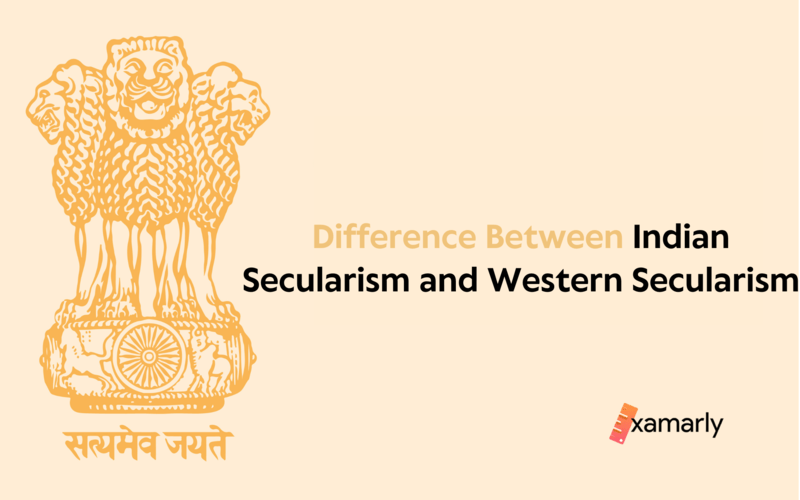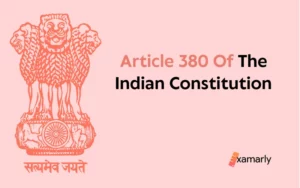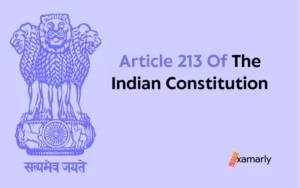An Overview
The concept of secularism, with its many facets, has been hotly debated and discussed in recent years. In this article, we will difference between Indian Secularism and Western Secularism
The primary tenet of secularism is the idea that religion and politics should be kept distinct from one another, and that people should be allowed to follow whatever religious beliefs they find acceptable.
In this essay, we will trace the development of secularism across time, looking at where it came from, what it stands for, and how it is faring in various parts of the world today.
We will also look at some of the major arguments against secularism and criticisms of it, as well as the future effects it may have on society and politics.
When and Where Did Secularism Begin?
The term “secularism” has been applied to numerous political and social philosophies and movements. Simplified, secularism is the view that religion has no place in public life and the public sphere.
The principle of secularism, or the separation of church and state, is widely seen as fundamental to the maintenance of modern democracies and the safeguarding of fundamental civil liberties.
The Enlightenment, a time of intellectual and cultural transformation in Europe that began in the late 17th century, can be seen as the cradle of secularism.
To better understand the universe, Enlightenment thinkers advocated using reason and science rather than blind faith in religious or governmental authority.
As a result, novel theories about human society and political organisation were conceived, paving the way for the birth of the contemporary secular state.
Secularism’s Guiding Principles
The premise of secularism, the separation of church and state, is commonly used to characterise the ideology. This divide is often viewed as vital to safeguard religious liberty and prevent the influence of religion on the government.
Furthermore, secularists typically value reason, scientific inquiry, and analytical rigour.
An essential tenet of secularism is the belief that everyone should be free to follow whatever religious beliefs they find acceptable.
This means that the state and society should remain agnostic on religious topics and not try to convert anyone to a specific faith.
In addition, secularists typically hold that all people, regardless of their religious or philosophical affiliations, deserve to be treated with respect.
Where Secularism Stands Now
Most people think of secularism when they think of the West, specifically of Europe and North America. But secularism is a worldwide phenomenon, present in a wide range of societies.
Some governments, like those in France and Turkey, are staunchly secular and advocate for a wall between church and state. Religion is more prominent in public life and the government is more laxly secular in countries like India and the United States.
Scepticism and disagreement over secularism persist despite the ideology’s widespread adoption around the world. Some people believe that secularism is a sort of cultural imperialism practised by Western powers against non-Western cultures.
Some people think secularism is dangerous because it undermines established norms and history. Further, there are many who claim that secularism is to blame for the decline of community values and the proliferation of selfishness and materialism.
An Introduction to Indian Secularism
Within Indian secularism, there are a few unique ideas that are “nearly comparable.” A Model of Secularism Based on the Principle of Distant Principles Harmony in the Community Theory.
The Principled Distance Model of Secularism is one of the more modern interpretations of secularism, and it proposes that a secular state should facilitate the harmonious coexistence of different faiths.
This paradigm suggests keeping religion and secular concerns apart in India.
Simplifying the thorny and often divisive issue of secularism in India is no easy task. In accordance with its constitution, India is a secular democracy in which religion has no role in public life.
In actuality, however, there have been claims that the government has favoured specific religious organisations and that minority communities have been subject to discrimination and violence.
The link between religion and governance in India is complicated by the fact that certain politicians have exploited religious rhetoric for personal advantage.
A Brief Introduction to Western Secularism
Secularism in the West is likewise a nuanced and sometimes contentious issue. The United States is a secular society where the separation of church and state is guaranteed by the constitution.
Religion, however, plays a major influence in Western politics and culture, and discussions about how closely religion should be tied to the state continue.
While some argue that the state should remain neutral on matters of faith, others contend that religious principles should guide public policy.
There have also been examples of political leaders using religious discourse for their personal benefit, further complicating the relationship between religion and government in the West.
Differences Between Indian Secularism and Western Secularism
- Definition: Indian secularism is based on the principle of equal treatment of all religions by the state, while Western secularism is based on the complete separation of church and state.
- State involvement: Indian secularism allows for some level of state involvement in religious matters, while Western secularism calls for a complete separation of church and state.
- Official religion: India does not have an official religion, while some Western countries may have a state religion.
- Religious minorities: India has a large number of religious minorities, and Indian secularism is designed to protect their rights and ensure their representation in government. Western secularism, on the other hand, is based on the principle of religious freedom for all individuals.
- Accommodation: Indian secularism allows for certain religious accommodations, such as personal laws for different religious communities. Western secularism, generally does not allow for such accommodations.
- Education: India provides religious education in government schools, while Western secularism calls for the separation of religious education from government-funded education.
- Role of religion in politics: Indian secularism is designed to keep religion out of politics, but in practice, religion plays a significant role in Indian politics. Western secularism is based on the principle that religion should not play a role in politics.
- Religious tolerance: Indian secularism promotes tolerance and acceptance of different religions, while Western secularism emphasizes the importance of freedom of religion and the right to practice one’s own religion.
- State symbol: India has a secular state symbol, while Western countries may have religious symbols on their flag or national emblem.
- Public sphere: Indian secularism allows for religious symbols and practices in the public sphere, while Western secularism calls for the strict separation of religion and the public sphere.
The Path Forward for Secularism
The subject of secularism is likely to become more pressing as globalisation continues to expand communication and trade opportunities.
As more and more individuals reject traditional religious and political authority, many analysts believe that secularism will continue to spread to other parts of the world.
Yet, when traditional beliefs and cultures are challenged, it is also feasible that secularism may meet with greater hostility.
There is no doubt that the current discussion and debate regarding the role of religion in society and government will determine the future of secularism.
As more people, institutions, and governments embrace secularism as an ideology, they must think carefully about how their actions may affect the rights and liberties of those who hold alternative views.
Secularism may lead to a more accepting and tolerant society in the future. The more secular ideas and practices spread, the more likely it is that people of all walks of life and faiths will learn to tolerate and appreciate one another.
This has the potential to foster a more peaceful and harmonious society by reducing tensions and disputes between various groups.
However, those who have conventional or religious values may feel alienated and excluded in a secular society, which raises concerns about the potential for growing polarisation and conflict.
Governments and communities will have to figure out how to give equal weight to secular values and the need to uphold people’s constitutionally guaranteed liberties and safeguards.
You Can Also Check Out The Article On Differentiate Between Regionalism and Multilateralism
In Conclusion
To sum up, secularism is a multifaceted notion with far-reaching implications for the future of politics and society.
Governments and society must weigh the benefits of secularism on tolerance, understanding, and peace with the risks it poses to the rights and liberties of those who have different religious beliefs.
Maintaining secular ideals while also safeguarding the rights of all citizens will be a challenging balancing act.
FAQs
What is the definition of Indian secularism?
Secularism in India is defined as the separation of religion and state. It is a principle that is guaranteed in the Indian Constitution, which ensures that the government will not discriminate against any individual or group on the basis of religion and will treat all religions equally.
How is secularism practised in India?
In India, secularism is practised through the government’s policies of non-interference in religious matters and the provision of equal rights and opportunities to individuals of all religions.
This is reflected in the Indian Constitution, which guarantees freedom of religion and prohibits discrimination on the basis of religion.
How is secularism different in India and the West?
Secularism in the West, particularly in countries like the United States and France, is based on the separation of church and state, where the government does not have any official religion. In contrast, secularism in India is based on the principle of equal treatment of all religions by the state, rather than the complete separation of religion and state.
How does secularism in the West differ from other forms of secularism?
The challenges to secularism in the West include the growing influence of religious fundamentalism, the erosion of the separation of church and state, and the increasing role of religion in politics.
Additionally, there are challenges related to the integration of religious minorities and the provision of religious accommodations in the public sphere.
How can the challenges to secularism in India be addressed?
Challenges to secularism in India can be addressed through a combination of policy measures, education, and public awareness campaigns.
These could include strengthening laws and institutions to protect religious minorities, promoting religious tolerance and understanding through education, and encouraging dialogue and cooperation among different religious communities.
Additionally, the government and civil society organizations should work together to combat religious extremism and promote secular values.
What is the definition of secularism in the West?
In the West, secularism is often defined as the separation of church and state. This means that the government does not have an official religion, and does not interfere in religious matters.
The government is also not supposed to promote or support any particular religion and should be neutral towards all religions.
How does secularism in the West differ from other forms of secularism?
Secularism in the West differs from other forms of secularism in that it is based on the complete separation of church and state, whereas in other countries, such as India, secularism is based on the principle of equal treatment of all religions by the state, rather than complete separation.
What are the challenges to secularism in the West?
The challenges to secularism in the West include the growing influence of religious fundamentalism, the erosion of the separation of church and state, and the increasing role of religion in politics.
Additionally, there are challenges related to the integration of religious minorities and the provision of religious accommodations in the public sphere.
How can the challenges to secularism in the West be addressed?
Challenges to the western concept of democracy can be addressed through a combination of policy measures, education, and public awareness campaigns.
This may include strengthening laws and institutions to protect religious freedom and prohibit religious discrimination, promoting religious tolerance and understanding through education, and encouraging dialogue and cooperation among different religious communities.
Additionally, the government and civil society organizations should work together to combat religious extremism and promote secular values.






